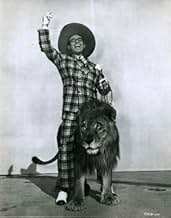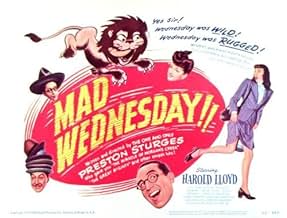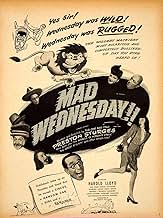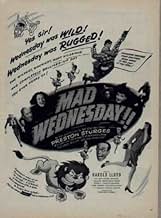AVALIAÇÃO DA IMDb
6,3/10
1,8 mil
SUA AVALIAÇÃO
Adicionar um enredo no seu idiomaHarold is a mild-mannered clerk who dreams about marrying the girl at the desk down the aisle. But then he loses his job, and when he is offered a potent drink at a bar, he goes on a very st... Ler tudoHarold is a mild-mannered clerk who dreams about marrying the girl at the desk down the aisle. But then he loses his job, and when he is offered a potent drink at a bar, he goes on a very strange and funny rampage (with a lion in tow).Harold is a mild-mannered clerk who dreams about marrying the girl at the desk down the aisle. But then he loses his job, and when he is offered a potent drink at a bar, he goes on a very strange and funny rampage (with a lion in tow).
- Prêmios
- 2 indicações no total
Avaliações em destaque
Harold Lloyd was one of Hollywood's greatest physical comedians and actors of Buster Keaton and Charlie Chaplin generation. This film marks his final performance but he could have done so much more in film. Regardless, his contributions should not be overlooked. Harold Lloyd plays Harold Dibbledock, a former football players, who ends up at a dead-end job as a clerk for 22 years. His ungrateful boss sends him packing after he fires him for years of service which was more like a prison sentence than a job. He never relived his glory days on the field. When he encounters an old man who seeks a few dollars to play the horses, he begins a new life after he takes a drink. Until then, Harold has never drank alcohol. He awakens up to learn that he's changed and doesn't have a clue about it. Margaret Hamilton plays Flora in a small performance. Anyway, he learns that he's bought a cab with a driver and a horse and a circus. Anyway, the film's best scenes are stolen by Jackie, the lion. It's a good film!
Calling this film brilliant isn't strong enough. The Dylan lyric "to laugh and cry in a single sound" fits because at the end of the film if your heartstrings are not being strummed then you may not be living.
Lloyd is an everyman squashed by life who encounters a bartender and asks for his first drink, ever. The bartender rises to the challenge and... well, Lloyd spends part of the film piecing together what he did after consuming it... I'm telling you, this film is BRILLIANT. The way it's shot, the acting, the brilliant casting, the writing all work together in a way that has no equal in cinema; the silent version of "The Thief of Baghdad" comes to mind for its sense of unbridled fun and its soaring spirit. This is so much more than a comedy, at some point the movie glides past that label and really grabs the brass ring, you know what I mean?
Truly brilliant, highest possible recommendation.
Lloyd is an everyman squashed by life who encounters a bartender and asks for his first drink, ever. The bartender rises to the challenge and... well, Lloyd spends part of the film piecing together what he did after consuming it... I'm telling you, this film is BRILLIANT. The way it's shot, the acting, the brilliant casting, the writing all work together in a way that has no equal in cinema; the silent version of "The Thief of Baghdad" comes to mind for its sense of unbridled fun and its soaring spirit. This is so much more than a comedy, at some point the movie glides past that label and really grabs the brass ring, you know what I mean?
Truly brilliant, highest possible recommendation.
A strange film. Written and directed by the brilliant filmmaker Preston Sturges, and starring silent film comedian Harold Lloyd (about 20 years after his prime), this movie tells the story of a college football hero who settles into a rut as he reaches middle age. Suddenly fired from his dead-end job, the milquetoasty Mr. Diddlebock uses his severance money to break out of his rut, embark on a series of adventures over a wild two or three days alongside a chance acquaintance, the aptly named Wormy (played by Sturges regular Jimmy Conlin), and pursue the woman of his dreams.
Even though this film lacks some of the subtlety, sophistication and polish of some of Preston Sturges' earlier work, it nevertheless (in true Sturges fashion) hides away some pretty heady ideas about growing old, taking chances, and living life to the fullest. this film, a minor entry in the Sturges catalog, would have been the crowning achievement in the career of anyone else. Watch this one, if only to find out what Harold really did on Wednesday!
Even though this film lacks some of the subtlety, sophistication and polish of some of Preston Sturges' earlier work, it nevertheless (in true Sturges fashion) hides away some pretty heady ideas about growing old, taking chances, and living life to the fullest. this film, a minor entry in the Sturges catalog, would have been the crowning achievement in the career of anyone else. Watch this one, if only to find out what Harold really did on Wednesday!
This film drags in some parts, and Lloyd I think puts off some modern viewers. The first time I watched it I thought it was the film equivalent of seeing Ali vs. Andre the Giant. But Sturges' brilliance is in here, and the degree to which it is derived from Lloyd is paid homage to in a wonderful, dark, surreal way. How can you not love a film that starts with the last moments of Lloyd's The Freshman and then shows the hero turned into a mail room stooge who gets buried by the corporate system? The ending is wonderfully hypnotic, happy? Well as is always the case, the poor down trodden guy figures out how to operate the machine just enough to produce his own deus ex machina. Sturges and Lloyd look more brilliant and visionary than ever from the vantage point of post-Enron, MCI, etc.
Between 1940 and 1944, Preston Sturges wrote and directed some of the best film comedy ever produced. His eight movies for that short period are all good, and it would not be an exaggeration to say that four of the eight have the touch of brilliance.
This sequence of movies came to an end when Sturges left Paramount following what he legitimately saw as increasing interference by studio bosses. His high stature at the studio hadn't prevented two of his movies from being taken out of his hands and re-cut against his wishes, one of which - The Great Moment - was never restored to the movie Sturges intended.
At this point, Sturges declined to join a rival studio, and instead formed a partnership with Howard Hughes, hoping to protect his future movies from the interference he could see was becoming more common within the studio system. However, for a combination of reasons, this partnership with Hughes was not a success, and the only film Sturges produces in that period - The Sin of Harold Diddlebock - shows a decline in his work.
The whole look and sound of the movie is inferior. It is impossible to know whether this decline was the result of an inevitable burn-out in his ability after such sustained success, or the absence of support and quality control that Paramount had applied to the benefit of the wonderful movies that had come before.
So... to "Diddlebock" itself! It is difficult to identify why it isn't as funny as we might expect. The film was created as a star vehicle for Harold Lloyd, and by all accounts his comedy instincts did not match those of Sturges. As much as Stuges tried, clearly such a big talent and personality as Lloyd was never going to completely submit to direction with which he didn't agree, and there must be some evidence of that in what we see on screen.
There is a complete lack of the 'sparkle' we have come to expect. The familiar faces around Lloyd remind us of the great Sturges movies, but to me this is like an inferior pastiche of a Sturges movie by a lesser hand, without such a reliable instinct for film comedy. But perhaps that describes what Preston Sturges had become in such a short time.
This sequence of movies came to an end when Sturges left Paramount following what he legitimately saw as increasing interference by studio bosses. His high stature at the studio hadn't prevented two of his movies from being taken out of his hands and re-cut against his wishes, one of which - The Great Moment - was never restored to the movie Sturges intended.
At this point, Sturges declined to join a rival studio, and instead formed a partnership with Howard Hughes, hoping to protect his future movies from the interference he could see was becoming more common within the studio system. However, for a combination of reasons, this partnership with Hughes was not a success, and the only film Sturges produces in that period - The Sin of Harold Diddlebock - shows a decline in his work.
The whole look and sound of the movie is inferior. It is impossible to know whether this decline was the result of an inevitable burn-out in his ability after such sustained success, or the absence of support and quality control that Paramount had applied to the benefit of the wonderful movies that had come before.
So... to "Diddlebock" itself! It is difficult to identify why it isn't as funny as we might expect. The film was created as a star vehicle for Harold Lloyd, and by all accounts his comedy instincts did not match those of Sturges. As much as Stuges tried, clearly such a big talent and personality as Lloyd was never going to completely submit to direction with which he didn't agree, and there must be some evidence of that in what we see on screen.
There is a complete lack of the 'sparkle' we have come to expect. The familiar faces around Lloyd remind us of the great Sturges movies, but to me this is like an inferior pastiche of a Sturges movie by a lesser hand, without such a reliable instinct for film comedy. But perhaps that describes what Preston Sturges had become in such a short time.
Você sabia?
- CuriosidadesDuring the scene where Harold Lloyd's character meets Jackie the lion, on the first take when Lloyd pets Jackie, the lion actually bit him on his right hand. However, he was not injured because the lion's teeth scraped against his two prosthetic fingers (Lloyd had lost most of his right hand in an on-set accident in 1919). After that, he refused to pet the lion ever again on- or off-screen, and in the second take, which was used for the film, his terrified squirming over the lion standing next to him is genuine.
- Erros de gravaçãoThe story takes place in New York. It is odd to see Los Angeles City Hall in the background of the final shot.
- Cenas durante ou pós-créditos"... and for the first time a young girl called Frances Ramsden playing the youngest Miss Otis"
- Versões alternativasOriginally released at 90 minutes; was then re-edited and re-released in a shorter 79-minutes version under the title "Mad Wednesday" in 1950.
- Trilhas sonorasAmerica, the Beautiful
(uncredited)
Music by Samuel A. Ward
Played during the presidential calendar montage
Principais escolhas
Faça login para avaliar e ver a lista de recomendações personalizadas
- How long is The Sin of Harold Diddlebock?Fornecido pela Alexa
Detalhes
- Data de lançamento
- País de origem
- Idioma
- Também conhecido como
- The Sin of Harold Diddlebock
- Locações de filme
- Memorial Stadium - Stadium Rim Way, Berkeley, Califórnia, EUA(football scenes edited from The Freshman)
- Empresa de produção
- Consulte mais créditos da empresa na IMDbPro
Bilheteria
- Orçamento
- US$ 1.712.959 (estimativa)
- Tempo de duração1 hora 29 minutos
- Cor
- Proporção
- 1.37 : 1
Contribua para esta página
Sugerir uma alteração ou adicionar conteúdo ausente






































